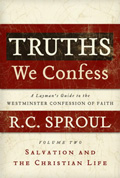
R. C. Sproul
Reviewed by: G. I Williamson
Truths We Confess, A Layman's Guide to the Westminster Confession of Faith, Vol. 2, by R.C. Sproul. Published by P&R Publishing, 2007. Hardback, 362 pages, list price $25.00. Reviewed by OP minister G. I. Williamson.
In this second of his projected three-volume study of the Westminster Confession of Faith, Dr. Sproul continues his unique style of exposition, this time covering chapters 9-22. I use the term unique because the author draws on so many things in his discussion. At one point, he speaks of a fear he experienced as a child (p. 276). At another, he uses illustrations drawn from his experience as a seminary student, and then again as a seminary teacher. He refers to Babe Ruth, Rod Serling, Chuck Colson, Arnold Palmer, John Gerstner, and his mother-in-law, relating each to truths of importance in the Westminster Confession. The overall effect is to engender a sense of the importance of sound doctrine to every aspect of the Christian life. Whatever else can be said of this method, it certainly kept my interest!
I found the chapters on the law of God and Christian liberty, and on liberty of conscience, exceptional. But I am constrained to say that I was surprised by two things in the chapter on religious worship and the Sabbath day. First, Dr. Sproul says that "the Confession's prohibition of 'visible representation' refers to representations of God the Father" (p. 312). But the Westminster Assembly clearly says in its Larger Catechism (Q/ A 109) that it refers to all three persons of the Godhead. Second, with reference to the singing of psalms, Dr. Sproul says, "This reference to singing mentions only the singing of psalms," but then he goes on to say that others "have also included in their worship the singing of hymns and spiritual songs" (p. 328). This gives a wrong impression of the Westminster Assembly by implying that they ignored two of the three terms used by the apostle Paul in Ephesians 5:19 and Colossians 3:16. But, as both the majority and the minority reports to the Thirteenth and Fourteenth General Assemblies of the OPC recognized, the book of Psalms itself contains all three (psalms, hymns, and songs). The use of these very texts as proof texts for the use of the Psalter shows that they were well aware of this. My difficulty here is not that Dr. Sproul disagrees with the Westminster Assembly, but that he makes it easy to get a wrong impression of their fidelity to Scripture in this instance.
In his discussion of the Sabbath, the author draws attention to the difference between "the continental view of the Sabbath and the Puritan view" with a riveting illustration: "Imagine the consternation of John Knox, who was expelled from England during the reign of Bloody Mary ... when he arrived in Geneva and found Calvin, with his family, bowling on the Sabbath day" (p. 342). I too think there's something to be said here in favor of Calvin's view of the Sabbath. But suffice it to say that I continue to enjoy - and recommend - this series.
November 09, 2025
November 02, 2025
October 26, 2025
October 19, 2025
October 05, 2025
Raising Sexually Faithful Kids and
Parenting Boys and Girls in a Gender-Confused World
September 28, 2025
Calvin’s Ecclesiology: A Study in the History of Doctrine
September 21, 2025
© 2025 The Orthodox Presbyterian Church